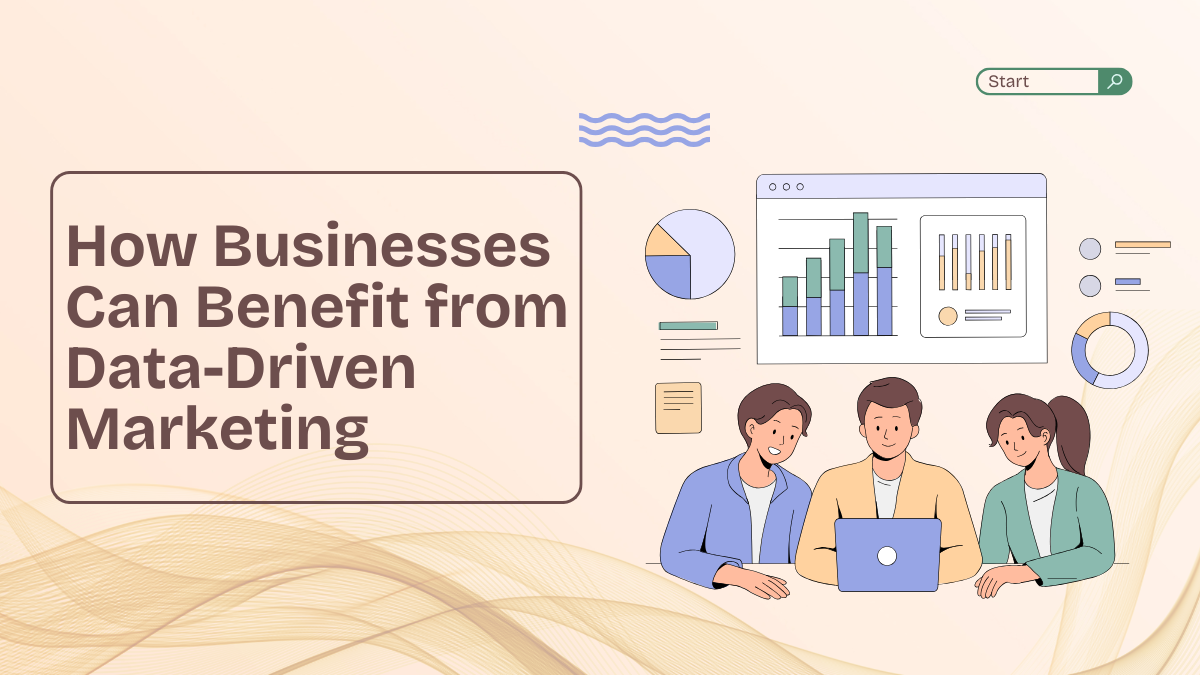
In today’s fast-changing digital landscape, marketing is no longer about guesswork or creative intuition alone. Modern businesses rely on insights derived from data to make smarter decisions, improve performance, and deliver personalized experiences that truly resonate with customers. This approach, known as data-driven marketing, has transformed how companies attract, engage, and retain their audience. Whether you’re a startup, an eCommerce brand, or an established Digital marketing agency in Chennai, understanding the power of data can help you create campaigns that generate measurable results and long-term growth.
What Is Data-Driven Marketing?
Data-driven marketing is the process of using customer data, analytics, and insights to guide every aspect of a marketing strategy. Instead of relying solely on intuition or assumptions, marketers analyze real-world information — such as demographics, user behavior, purchase history, and engagement metrics — to make informed decisions.
For example, a brand can use data to identify which products are most popular, what time customers are most active online, or which messages lead to the highest conversions. This insight allows marketers to optimize their campaigns for better reach, engagement, and ROI.
In essence, data-driven marketing enables businesses to move from “We think this will work” to “We know this works.”
Why Data Matters in Modern Marketing
Data is the backbone of every successful digital strategy. In the age of automation, personalization, and analytics, businesses that use data effectively gain a significant competitive edge. Here’s why it’s so crucial:
- Improved Decision-Making: Data helps marketers eliminate guesswork and base their actions on facts, leading to more effective campaigns.
- Customer-Centric Strategies: Insights from data allow businesses to tailor their messages and offerings to what customers truly want.
- Better Budget Allocation: Data identifies which channels perform best, so marketing budgets are spent wisely.
- Enhanced Measurement: You can track success in real-time, adjusting campaigns quickly for optimal results.
Data transforms marketing into a precise, predictable, and profitable process.
Key Benefits of Data-Driven Marketing for Businesses
1. Enhanced Personalization
Customers today expect personalized experiences. They don’t want generic ads; they want messages that speak directly to their needs and preferences.
With data-driven marketing, businesses can segment audiences based on demographics, behavior, or past interactions. This allows you to deliver customized content, offers, and product recommendations — increasing engagement and conversions.
For instance, an eCommerce brand can use purchase data to send targeted emails suggesting related products, while a travel company can promote destinations based on a customer’s previous searches. Personalization makes your brand more relevant, relatable, and memorable.
2. Improved ROI and Efficiency
One of the biggest advantages of data-driven marketing is improved return on investment (ROI). When you know which campaigns generate the most engagement or conversions, you can allocate resources accordingly.
By continuously tracking metrics such as cost per click (CPC), conversion rates, and customer lifetime value (CLV), businesses can identify what works and eliminate what doesn’t. This reduces wasted spending and ensures every dollar contributes to measurable growth.
Over time, this optimization leads to more cost-efficient marketing and stronger profitability.
3. Smarter Audience Targeting
Instead of broadcasting your message to everyone, data-driven marketing allows you to reach the right people at the right time. Through analytics and audience insights, businesses can identify specific segments likely to respond positively to their campaigns.
For example, data might reveal that a particular age group or region responds better to a specific ad format or message. You can then focus efforts on those audiences for maximum impact.
Better targeting means fewer wasted impressions and more meaningful engagement — a key factor in long-term success.
4. Real-Time Performance Tracking
Traditional marketing often relied on post-campaign evaluations, but with data-driven marketing, businesses can monitor performance in real-time. Using analytics tools like Google Analytics, HubSpot, or Meta Business Suite, marketers can track user behavior, measure conversions, and make instant adjustments.
If a particular ad isn’t performing, you can tweak visuals or headlines immediately. If a specific audience shows strong engagement, you can increase budget allocation. This agility ensures that campaigns are always optimized for the best possible results.
5. Better Customer Retention and Loyalty
Data isn’t just for attracting new customers — it’s also invaluable for retaining existing ones. By analyzing customer behavior and feedback, businesses can anticipate needs, resolve pain points, and offer timely rewards or loyalty programs.
For example, if data shows that customers often churn after a certain period, you can introduce re-engagement campaigns or special offers to keep them coming back. This proactive approach fosters stronger relationships and long-term brand loyalty.
6. Informed Product Development and Innovation
Marketing data can reveal more than just audience preferences — it can also guide business growth decisions. By analyzing patterns in customer demand, search trends, and feedback, companies can identify gaps in the market or new opportunities for innovation.
For instance, if data indicates that customers frequently search for a specific feature your product lacks, it can guide product development teams to address that demand. This alignment between marketing and product strategy ensures your brand stays relevant and competitive.
7. Competitive Advantage in the Market
In today’s saturated digital environment, staying ahead of competitors means being faster, smarter, and more strategic. Businesses that use data effectively can anticipate market trends, adapt quickly, and outperform competitors.
From understanding emerging keywords to predicting seasonal buying patterns, data equips marketers with the insights they need to act decisively. This agility gives your brand a powerful advantage in both marketing effectiveness and customer satisfaction.
How to Implement a Data-Driven Marketing Strategy
1. Collect the Right Data
Start by gathering relevant data from various touchpoints — your website, social media, email campaigns, and CRM systems. Focus on metrics that align with your goals, such as traffic, engagement, conversions, and customer retention.
2. Use Reliable Analytics Tools
Invest in tools that offer comprehensive insights, such as Google Analytics, HubSpot, or SEMrush. These platforms help you track and visualize data efficiently.
3. Integrate Data Across Channels
Combine insights from different marketing channels to get a holistic view of your audience’s journey. This helps in delivering consistent, omnichannel experiences.
4. Prioritize Data Privacy and Compliance
Customers trust brands that protect their data. Ensure compliance with privacy laws such as GDPR and clearly communicate how you collect and use customer data.
5. Continuously Analyze and Optimize
Data-driven marketing is an ongoing process. Regularly review your performance metrics, identify trends, and make data-informed decisions to enhance future campaigns.
The Future of Data-Driven Marketing
As artificial intelligence (AI), automation, and machine learning continue to evolve, the future of data-driven marketing looks even more promising. Predictive analytics can help businesses forecast consumer behavior, automate personalization, and make smarter marketing decisions faster than ever before.
In the coming years, brands that harness data effectively will dominate the market — not just because they understand their customers, but because they can anticipate their needs before anyone else.
Conclusion
Data-driven marketing is no longer optional — it’s essential for any business that wants to thrive in the digital age. By leveraging data, brands can personalize experiences, improve efficiency, and make decisions that lead to measurable growth.
Every marketing dollar becomes more impactful when backed by insights, and every campaign becomes smarter with the right data. Businesses that embrace this analytical approach not only strengthen customer relationships but also position themselves as leaders in their industry.
Whether you’re just starting out or scaling your strategy, partnering with an experienced SEO Company in Chennai can help you harness the full potential of data. With expert tools, insights, and strategy, your business can make confident decisions, optimize campaigns, and achieve sustainable success through data-driven marketing.



